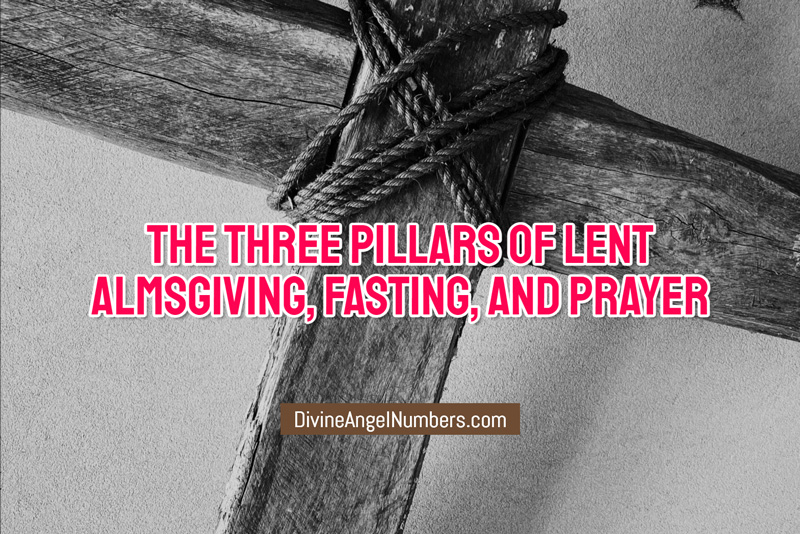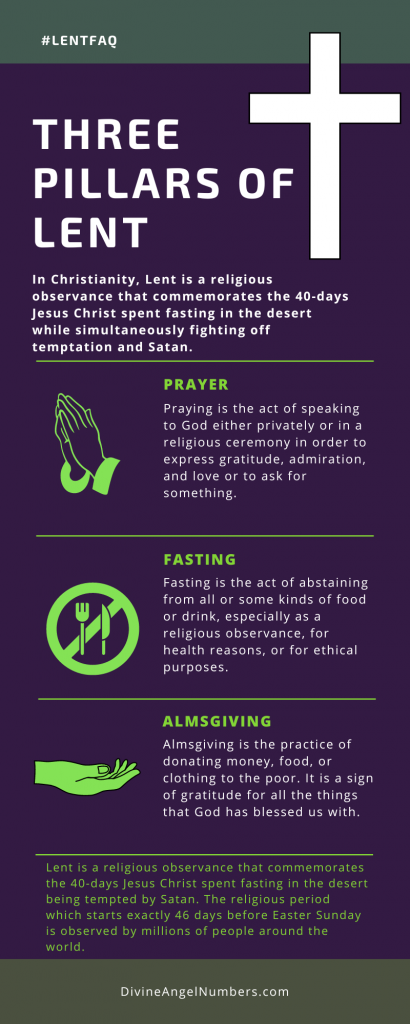In Christianity, Lent is a religious observance that commemorates the 40-days Jesus Christ spent fasting in the desert while simultaneously fighting off temptation and Satan.
Many people observe this holy period by fasting, sacrificing, and almsgiving (considered as three pillars of Lent). Lent takes place exactly 46 days before Easter Sunday and even includes the Holy Week.
The beginning of Lent depends upon the date of Easter. Easter follows a lunar calendar and is usually celebrated on a Sunday that follows the first full moon after March 21, the spring equinox.
Therefore, Easter Sunday usually lands between March 22 and April 25. Easter is deciding factor of all the other movable celebrations in the Church calendar.
Lent is celebrated all over the world and different countries have different ways of celebrating the 40-day long period. For instance, in Denmark, the last Sunday before Lent officially begins is known as ‘Fastelavn.’
On this day children dress up in costumes and eat cream or jam-filled buns. In Greece, the first day of Lent is a national holiday. People in Greece normally go to the countryside or the beach for a picnic.
In Goa, India, Lent begins with carnival-like festivities which include dancing, music, and feasting, finally culminating in a Mass.
Historically, the main focus of observing Lent was on self-examination and self-denial in preparation for Easter. Christians usually abstained from eating food in the earliest demonstrations of this process. However, over the years the rules governing fasting have been relaxed significantly.
The Three Pillars of Lent
The three pillars of Lenten observance are prayer, fasting, and almsgiving.

Prayer
Praying is the act of speaking to God either privately or in a religious ceremony in order to express gratitude, admiration, and love or to ask for something. Prayer is an action that helps a person turn their attention towards God, contemplate, listen and talk to him, read his words, and meditate on them. During Lent, praying helps celebrate the joyful redemption of the mysteries and helps you get closer to getting.
Mother Teresa once said, “Prayer makes your heart bigger. Until it is capable of containing the gift of God himself. You can pray while attending Lent retreats, spiritual exercise, daily acts of consecration or personal devotion, receiving the sacraments regularly, a meditation on the Holy Scripture, readings of saints, fathers of the Church, or spiritual authors.”
During Lent, you can also pray at the Stations of the Cross on Fridays, reflect on a Bible verse each day especially the passages related to the Passion of Christ, attend daily Mass, confess regularly, and pray when you wake up and/or before going to bed.
The Catechism of the Catholic Church says that prayer is, “This mystery (of faith), then, requires that the faithful believe in it, that they celebrate it, and that they live from it in a vital and personal relationship with the living and true God. This relationship is prayer.
Prayer is an essential component of growth in our relationship with the Living God. Prayer is the first step to reconciling ourselves with God. Father Felmar says, “Like today’s Gospel, this season reminds us that God wants us to be reconciled to him and to one another. He wants us to shed anger, bitterness, and resentments that could decay our souls. If we truly desire God’s love and mercy, we must learn to humble ourselves and seek not only divine forgiveness but to establish life-giving relationships around us.“
There are several Bible verses that help us meditate. For instance, “But when you pray, go to your private room, shut yourself in, and so pray to your Father who is in that secret place, and your Father who sees all that is done in secret will reward you.” And “All who believed were together and had all things in common… Every day they devoted themselves to meeting together in the temple area and to breaking bread in their homes.
Fasting
Fasting is the act of abstaining from all or some kinds of food or drink, especially as a religious observance, for health reasons, or for ethical purposes.
People fast during religious holidays and festivals because the restriction of consumption indicates that we are ready to sacrifice anything in our lives in order to deprive the evil within and for the privation of good for the glory of God.
During Lent, Catholics do not completely abstain from food but consume it in moderation. For instance, having only one big meal or two small meals without consuming any snacks in between.
There is no emphasis on abstaining from drinking liquids. On Ash Wednesday and Good Friday, many Catholics practice abstaining from red meat and prefer consuming only fish and shellfish.
Fasting doesn’t always mean abstaining from food. During Lent, you can show your devotion to God by drinking and eating in moderation, reducing expenses in trips, clothing, and material acquisitions, abstaining from the internet, television, or any other forms of entertainment, and avoiding all types of sins, especially the sins of the flesh: sloth, gluttony, and lust.
You can also observe lent by giving up a luxury. For instance, chocolate, ice cream, or coffee. Try taking the bus, walking, or riding your bike every day than driving your car. Do not use social media during the Lenten period and avoid cursing, gossiping, having intrusive thoughts, and unnecessarily speaking.
The Encyclopedia of Catholic Spirituality and the Rite of Christian Initiation of Adults says that “Fasting is one of the most ancient actions linked to Lent. Fasting rules have changed through the ages, but throughout Church, history fasting has been considered sacred.“
The prophet Isaiah insists that fasting without changing our behavior is not pleasing to God. Therefore, the goal of fasting is linked with prayer. The pangs of hunger remind us of our hunger for God, and prayer and fasting together bring us to what Lent is about – a deeper conversion.”
Pope Francis also says that “Fasting makes sense if it really chips away at our security and, as a consequence, benefits someone else if it helps us cultivate the style of the Good Samaritan, who bent down to his brother in need and took care of him.” There are several reasons behind fasting during Lent:
1) It teaches us an important lesson in spiritual discipline. By fasting we exercise our spiritual muscles as we refrain from indulging in a basic physical desire such as eating, we are refusing to be dominated or controlled by the needs of our bodies.
2) During a busy day, we all forget to think much about God. However, when we are fasting, we have to be alert and in control of our instincts, and this reminds us to think about God and the sacrifices he made for us.
3) Fasting can be looked at as a form of offering to show our devotion to our beliefs. By denying ourselves to enjoy something we love, we are declaring that there is something more important than purely physical pleasure in our life.
Almsgiving
Almsgiving is the practice of donating money, food, or clothing to the poor. It is a sign of gratitude for all the things that God has blessed us with. An Almsgiving is an act of love towards people in need. Therefore, especially during the Lenten period, people are encouraged to help poor people and be generous towards them.
According to John 3:17, “ Whoever possesses the goods of this world, and sees his brother to be in need, and yet closes his heart to him: in what way does the love of God abide in him?”
Tobit 4:10-11 says, “For almsgiving delivers from death and keeps you from going into Darkness. Indeed, almsgiving, for all who practice it, is an excellent offering in the presence of the Most High.”
Almsgiving is the action that leads Christians to see their fellow man, love them, listen to them, and give them our time, help, advice money, shelter, company, and affection. We shouldn’t limit the practice of almsgiving to just material goods, because it also includes giving the gift of self.
There are several Bible verses that meditate on the topic of almsgiving. For instance, 2 Cor 8:9 says, “He became poor so that by his poverty you might become rich.” Psalm 37 exclaims, “The wicked borrow but do not repay, they just are generous in giving.” And Luke 12:15 says, “Take care to guard against all greed, for though one may be rich, one’s life does not consist of possessions.’
Pope Francis says, “God’s becoming man is a great mystery! But the reason for all this is His love, a love which is grace, generosity, a desire to draw near, a love which does not hesitate to offer itself in sacrifice for the beloved…Lent is a fitting time for self-denial; we would do well to ask ourselves what we can give up in order to help and enrich others by our own poverty. Let us not forget that real poverty hurts: no self-denial is real without this dimension of penance.”
Conclusion
Lent is a religious observance that commemorates the 40-days Jesus Christ spent fasting in the desert being tempted by Satan. The religious period which starts exactly 46 days before Easter Sunday is observed by millions of people around the world.
During the 40 days of Lent, excluding the six Sundays, devotees abstain from food and other commodities of pleasure to show their devotion and love for God.
The three pillars of Lenten observance, which are prayer, fasting, and almsgiving help us get closer to God. With praying we ask God for the strength to live out our baptismal promises more fully.
Fasting acts as a metaphor for the hunger and longing we feel for God. And almsgiving helps us show gratitude to God for our wealth and prosperity by donating food, clothing, and our time to the poor and needy.

